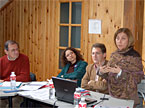IUCN Spanish Committee Creates New Technical Office to Implement and Manage its Programme

THIS IS THE RESULT OF THE STATUTORY REFORM TO FACILITATE THE ESTABLISHMENT OF A PERMANENT ADMINISTRATIVE AND TECHNICAL STRUCTURE
The General Assembly of the IUCN Spanish National Committee during their meeting held on 18-19 February 2008 in Camargo, has approved unanimously a statutory reform that will allow for the establishment of a permanent administrative and technical base for the Committee. The office will be responsible for the management and coordination of the Committee's programme of activities and based, on a temporary basis, at the headquarters of Fundación Naturaleza y Hombre. This new programme will have as main axes of action international cooperation for the environment and the strengthening of UNESCO World Heritage Sites as well as – in the short term – participation in the forthcoming World Conservation Congress in Barcelona next October.
In this new framework, backed by the General Assembly and presented by the Committee Chair, Carlos Sánchez , international cooperation activities will be implemented through the IUCN programme Alianzas and the reinforcement of links with environmental organisations in the Euro-Mediterranean area.
The objective of the IUCN Programme for Mesoamérica, Alianzas, is to provide support to local conservation groups in transboundary areas of high natural value in Guatemala, El Salvador, Costa Rica, Nicaragua y Panamá, with a view to promote an effective environmental management and give an impulse to sustainable development in the communities concerned. This area of work in Central America is part of the general strategy of the Spanish National Committee to cooperate with Latin America .
On the other hand, activities in the Euro-Mediterranean region will be based upon the establishment of a collaboration framework with the IUCN Centre for Mediterranean Cooperation in Málaga, and agreements with other IUCN national committees such as France .
World Heritage
The action plan of the Spanish National Committee aims at implementing a programme devoted to the strengthening of sites declared as World Heritage by UNESCO following natural criteria - included in the Natural and Mixed categories (1) - within the national territory and with a future projection towards Latin America.
With this objective, it was suggested that an Observatory for Natural and Mixed World Heritage Sites be created, whose main function in Spain would be the support of new potential applications, the valuation and management assessment of already declared areas and the development of an axis for Latin American sites, with the same objectives to promote, valuate and analyse the management model.
World Conservation Congress
The participation of the IUCN Spanish National Committee in the forthcoming World Conservation Congress to be held in Barcelona from 5 to 14 October under the general them of A Diverse and Sustainable World , will focus on the promotion of resolutions and recommendations towards the preservation of the Spanish natural heritage and the defence of the national interests in the election process for the renewal of the IUCN Presidency and Council.
Complementarily, the committee will be an active partner in the events calendar during Congress, with the organisation of activities such as a workshop on Environmental cooperation in Latin America and one information stand for the National Committee and its members.
The 2008 Action Plan of the IUCN Spanish National Committee is co-funded by Fundación Biodiversidad ( www.fundacion-biodiversidad.es ), within the collaboration agreement signed last December.
More information:
Israel Marcos, Responsable de Comunicación, Fundación Naturaleza y Hombre
marcos@fnyh.org
(1) The World Heritage Comité of UNESCO contemplates the declaration of sites according to natural features (Natural World Heritage), as in the case of Garajonay and Doñana National Parks , or according to a combination of these features with cultural values of particular relevance (Mixed World Heritage), with the only examples of the Pyrenees-Monte Perdido and the island of Eivissa .
|